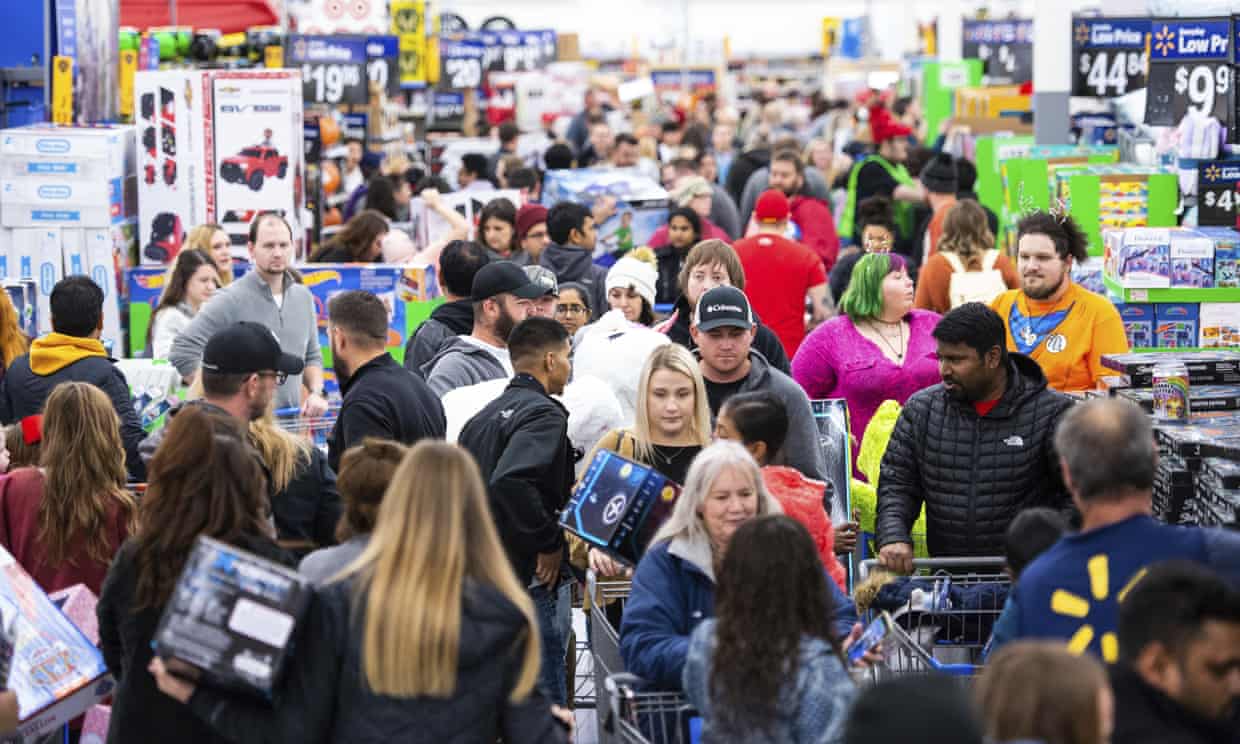
Mass consumerism is destroying our planet. This Black Friday, let’s take a stand
by Alan BradshawWith climate catastrophe on the horizon, we should reject this orgy of consumption – and find joy in not shopping at all
In 2008 a Walmart worker was trampled to death by crowds at a Black Friday shop opening in New York. The event was one of a handful of incidents that became emblematic of that distinctly American occasion. Black Friday, which takes place today, still registers as the busiest shopping day of the year in the US.
But in recent years, shopping aisles in the UK have started to tremble too. Black Friday, once only seen by Britons when watching US television shows, is a regular part of the calendar.
It was most noticeably introduced, in 2013, by Asda, itself owned by Walmart, alongside mainstream retailers such as Argos, John Lewis and Amazon. Slowly these strange annual scenes of feverish consumption made news across the UK: the police were called to 15 different Tesco outlets in 2014.
Inevitably, Black Friday has now established itself as one the biggest retailing days in Britain, too – but this year it’s a far more muted affair, with sales spread over an extended period. Amazon, for example, now heralds Black Friday with a whole week of discounts – a trend matched by many competitors. While some retailers continue to tantalise shoppers by announcing their Black Friday opening hours, the day itself hasn’t the spectacular veneer of its US cousin.
In Britain there is a long tradition of moralising about mindless materialism. As far back as the Elizabethan era, a moral panic emerged about an “orgy of spending”. Later, Marxist philosophers such as Theodor W Adorno treated the consumerism of the postwar era as a foolish “fetish”. Books such as The Hidden Persuaders by Vance Packard, published in 1957, and No Logo by Naomi Klein in 1999, became huge sellers in their eras, both describing a world that had become colonised by marketing and branding.
By the 1990s and 2000s, exuberant consumer culture was confronted by an equally exuberant anti-consumerism. Popular movements such as Adbusters and Reverend Billy and the Church of Stop Shopping, and movie hits such as Fight Club and American Psycho denounced a spiritually bankrupt culture. These concerns were accompanied by increasing environmental activism. By now, confronted by the stark realism of the climate emergency messages delivered by Greta Thunberg and Extinction Rebellion, the penny is starting to drop as we learn to correlate our lifestyles with the fate of the planet.
Today, in austerity Britain (and, yes, for all the talk of spending promises, austerity is still here), the idea of excessive consumerism seems to have lost much of its resonance. Memories of consumerism and easy credit seem to have become tainted by the recession. Academics have observed how Britons felt ashamed of their pre-crash consumerism and (wrongly) felt personally accountable for the austerity that followed, identifying particular consumer objects – such as expensive tracksuits and conservatories – as symptomatic of a flaw in the national character.
For many consumers, shopping has become mixed with guilt and a sense of responsibility as it increasingly depends on credit card debt and the labour of poorly paid and precarious workers – and it has a heavy environmental toll. Buying something today is also an experience drained of fun: it often entails making sure you are in when the package arrives, unpacking it and realising that it isn’t what you wanted.
In this context, Black Friday arrives in all its ambivalence. We may still be served the familiar spectacles of excited consumers carrying giant plasma TVs out of shops, while an army of delivery workers ring doorbells throughout the nation. But there is no shine and veneer, and the rampant consumerism of the 1990s, with its attendant resistance, seems very far away.
The time is right for a more resonant and joyful anti-consumerism. The recognition that we need to downsize our lifestyles for environmental reasons now corresponds not with the false political economy of austerity, but the very real awareness of the damage that consumer capitalism wreaks on the world.
The challenge, then, is to make anti-consumerism joyful by emphasising the satisfaction and necessity of becoming more sustainable and refusing to fuel a system grounded in the exploitation of people and the environment. Today, the greatest pleasures might be found in not shopping at all.
• Alan Bradshaw is a professor of marketing at Royal Holloway, University of London and is proudly on strike. He is author of Advertising Revolution: The Story of a Song From Beatles Hit to Nike Jingle.